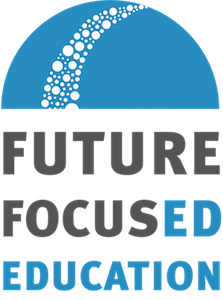Youth Apprenticeships: Mutually Beneficial for Youth and Employers
PART I
By Bianca Dacres | Policy Analyst at Partnership to Advance Youth Apprenticeship

Youth apprenticeship is an exciting part of the growing work-based learning landscape in New Mexico. Programs like Future Focused Education’s X3 NeXt Youth Apprenticeship program pave the way for students to succeed in their careers while also helping employers find local talent.
What are youth apprenticeships?
Apprenticeships are a time-tested method of training workers for highly skilled roles, combining paid on-the-job learning with technical instruction.
This form of work-based learning exists informally in many workplaces, and has a formal definition under New Mexican and Federal law. Although regulations establish a minimum apprentice age of 16, few apprenticeships in the U.S. are designed to start when apprentices are in high school.
That’s why youth apprenticeship programs are so powerful–they take all of the elements of apprenticeship, which have proven to be successful, and customize them to fit high school curriculum. Plus, they provide a debt-free way for students to get a head start on college and provide employers the opportunity to train their future workforce.
Currently, youth apprenticeship does not have a formal federally recognized definition in the United States, which means that Future Focused, in partnership with the Partnership to Advance Youth Apprenticeship (PAYA), gets to lead the way in creating a model of youth apprenticeship in New Mexico.
To promote quality and consistency, PAYA, a multi-year initiative of the nonpartisan think tank New America, collaborated with a coalition of national partners in 2018 to develop a standardized definition along with five guiding principles for youth apprenticeship.
High-quality youth apprenticeship programs should include four key components:
- Paid, on-the-job learning under the supervision of skilled employee mentors
- Related, classroom-based instruction
- Ongoing assessment against established skills and competency standards
- Culmination in a portable, industry-recognized credential and post-secondary credit
why youth apprenticeship
Youth Apprenticeship programs are built on ecosystems of partners that cooperate to align programs and coordinate opportunities & support for students in the programs. This coordination/partnership has the potential to better meet students’ needs. In this way, they can help improve outcomes for students, especially those who may face barriers.
Because they combine paid, on-the-job experience with no-debt college coursework, youth apprenticeships are a promising solution to the unique challenges that young adults face today. Youth apprentices work part-time, which allows them to earn an immediate wage without competing with adult workers for family-sustaining incomes.
This experience ensures that young people are prepared for well-paying jobs in the near future and are set up for successful careers in the long run. A good apprenticeship program should also include a structured mentorship component and related coursework that leads to industry–valued credentials and degrees.
Here in New Mexico, the X3 and NeXt internships at Future Focused Education have proven to be especially successful with their mentorship component as evidenced by the fact that many mentor and intern pairs have formed lasting connections. For example, when surveyed, 85 percent of X3 interns said they were likely or very likely to reach out to their mentors for support outside of the program. Mentors also reported personal growth and connectedness from their roles as mentors.
Importantly, youth apprenticeships offer a variety of mutual benefits for both students and employers. Students benefit from exploring career interests, earning while they learn, gaining hands-on experience, and building a professional network.
For their part, employers benefit from their involvement in youth apprenticeships by exposing future workers to opportunities in their industry, working closely with high schools and colleges to strengthen training curricula, and building a pathway to a more robust and diverse workforce.
youth apprenticeship in new mexico
In New Mexico, youth apprenticeships could especially impact those who are most affected by inequities in education, such as student groups named in the Yazzie/Martinez decision–students with disabilities, English learners, Indigenous students, and those who are economically disadvantaged. In 2018, Judge Sarah Singleton ruled that New Mexico had failed to provide these specific populations of students with opportunities to get them college and career ready. Youth apprenticeship programs, especially when paid and offered in rural areas, can help address these inequities.
For more on how youth apprenticeship is one way of increasing equity in education, look out for part two of this blog series, which will be out in two weeks.
Additional youth apprenticeship resources
Learn more about how youth apprenticeships benefit young people and partners:
- Test out the Youth Apprenticeship Quality Assessment Tool. It aims to assist education providers, employer and industry partners, intermediary organizations, and other youth apprenticeship leaders in identifying ways to improve learning success
- Find out more about how PAYA is connecting the learning needs of students with the talent needs of industry
- Check out the National Governors Association’s policy playbook that outlines ways state policy stakeholders can support the expansion of youth apprenticeships
- The U.S. Department of Labor's overview includes information on apprenticeship investments, data, and regulatory policies
- Jobs for the Future “Why I Apprentice” video series highlights the benefits of youth apprenticeship programs

Bianca Dacres is a policy analyst with the Partnership to Advance Youth Apprenticeship in the Center on Education & Labor.
Dacres is a master of public policy candidate at George Washington University’s Trachtenberg School of Public Policy and Public Administration, concentrating on education policy. She holds a political science BA with a minor in broadcast journalism from Florida A&M University.



Comments
It’s great that my sister’s all about enrolling her kid in the NYPD youth education thing. You know, she’s seen how it brings cops and our neighborhood kids closer. It’s like a cool opportunity for the little one to learn from officers in a chill and educational setting. It’s like what you said, programs for youth apprenticeship are based on ecosystems of partners that work together to arrange opportunities and assistance for students participating in the programs, which may better satisfy the requirements of the kids.